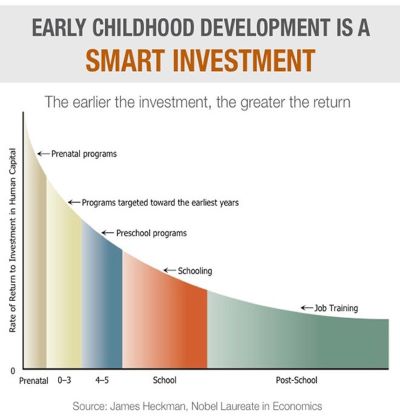Context:
Investing in the early childhood development of a nation's children is not only a moral imperative but also an essential economic strategy. In the case of India, with its burgeoning population and aspirations for economic growth, prioritizing early childhood care and education (ECCE) is crucial for realizing the full potential of its demographic dividend. Despite the significance of this issue, ECCE has often been overlooked and under-invested, relegated to the realm of "child's play" or confined to the household domain. However, as the government increasingly recognizes the pivotal role of women-led development and the importance of nurturing human capital, there is a growing acknowledgment of the need to invest in the early years of a child's life.
The Economic Argument for Early Childhood Investment:
The rationale for increased investment in ECCE is straightforward: human resources are the cornerstone of a nation's development, and early childhood represents the foundation of human development. Over the years, India has made strides in expanding access to education, achieving universal primary enrollment, and now, shifting its focus towards improving quality and learning outcomes. However, there remains a pressing need to address the challenges faced by young learners, many of whom struggle with basic literacy and numeracy skills. Recognizing the importance of early intervention, initiatives such as the National Initiative for Proficiency in Reading with Understanding and Numeracy (NIPUN) Bharat and Poshan Bhi Padhai Bhi have been launched to enhance ECCE quality through the Anganwadi system.
In the interim Budget of 2024, promising measures such as the expedited upgradation of Saksham Anganwadis and the provision of Ayushman Bharat services for Anganwadi workers highlight the government's commitment to investing in early childhood development. Furthermore, the significant increase in the allocation for teaching-learning materials underscores a shift towards prioritizing ECCE within the broader education budget. While the current budgetary allocation for the Anganwadi system is substantial, it is essential to assess the macroeconomic implications of this investment and its potential impact on GDP growth and social development.
The Role of the Anganwadi System:
The Anganwadi system serves as the backbone of India's early childhood care and education infrastructure, catering to millions of children under the age of six, particularly those from marginalized communities. Research has demonstrated the positive impact of Anganwadi attendance on children's cognitive and motor skills, contributing to improved educational outcomes and reducing gender and income-related disparities. Studies have shown that children exposed to the Anganwadi system from an early age are more likely to complete higher grades of schooling, highlighting the long-term benefits of quality ECCE provision.
Despite its importance, the Anganwadi system faces numerous challenges, including inadequate infrastructure, staffing shortages, and limited access to quality learning materials. Addressing these issues requires sustained investment and policy support to strengthen the capacity and effectiveness of Anganwadi centers. Moreover, there is a need for rigorous research to evaluate the impact of the Anganwadi system on broader socio-economic indicators, including health outcomes, educational attainment, and social cohesion.
The Need for Research and Evidence-Based Policy:
In order to formulate evidence-based policies and allocate resources effectively, it is imperative to conduct systematic research on the economic and social implications of early childhood development in the Indian context. While international studies have highlighted the high returns on investment in early childhood, India requires localized evidence to guide policy making and resource allocation. Longitudinal studies tracking the outcomes of children exposed to the Anganwadi system can provide valuable insights into the cost-effectiveness of ECCE interventions and their contribution to national development goals.
Furthermore, research should extend beyond academic circles to engage policymakers, practitioners, and communities in shaping effective early childhood policies and programs. Building a robust evidence base for ECCE will not only strengthen the case for increased investment but also ensure that resources are directed towards initiatives that yield the greatest impact on children's development and well-being.
Conclusion:
Investing in India's children is not just a moral imperative but also a strategic economic decision. By prioritizing early childhood care and education, India can lay the foundation for sustainable economic growth, social development, and human capital formation. Initiatives such as the Anganwadi system play a crucial role in providing essential services to young children, but greater investment and policy support are needed to strengthen their effectiveness and reach. Through rigorous research and evidence-based policymaking, India can unlock the full potential of its youngest citizens, paving the way for a brighter and more prosperous future.
|
Probable Questions for UPSC Mains Exam
|
Source – The Hindu







